Abstract
OBJECTIVES. This study investigated the influence of psychosocial stress, maternal schooling, social support, psychological well-being, alcohol, and smoking on intrauterine growth retardation and premature delivery. METHODS. At a Copenhagen university hospital, 2432 pregnant women completed a questionnaire on general health, psychosocial stressors, and sociodemographic characteristics. RESULTS. In 212 cases (8.7%) the women delivered prematurely. Preterm delivery as associated with psychosocial stress (adjusted odds ratio [OR]=1.14 for each 1-point increase on the psychosocial stressor 5-point scale and 1.92 for the whole scale) and poor school education (adjusted OR=2.62 for 7-9 years of schooling, 1.91 for 10 years, and 1.0 for 11-13 years). In 152 cases (6.3%), infants had a birthweight below the 10th percentile. Intrauterine growth retardation was associated with smoking, daily drinking, school education, and social network variables. In a multiple logistic regression model, intrauterine growth retardation was associated with smoking habits (adjusted OR=2.40 for 0-9 cigarettes daily, 2.68 for 10-15 daily, and 2.88 for more than 15 daily). CONCLUSIONS. Psychosocial stressors and limited duration of schooling appeared to influence preterm delivery. Smoking habits influenced intrauterine growth retardation.
Full text
PDF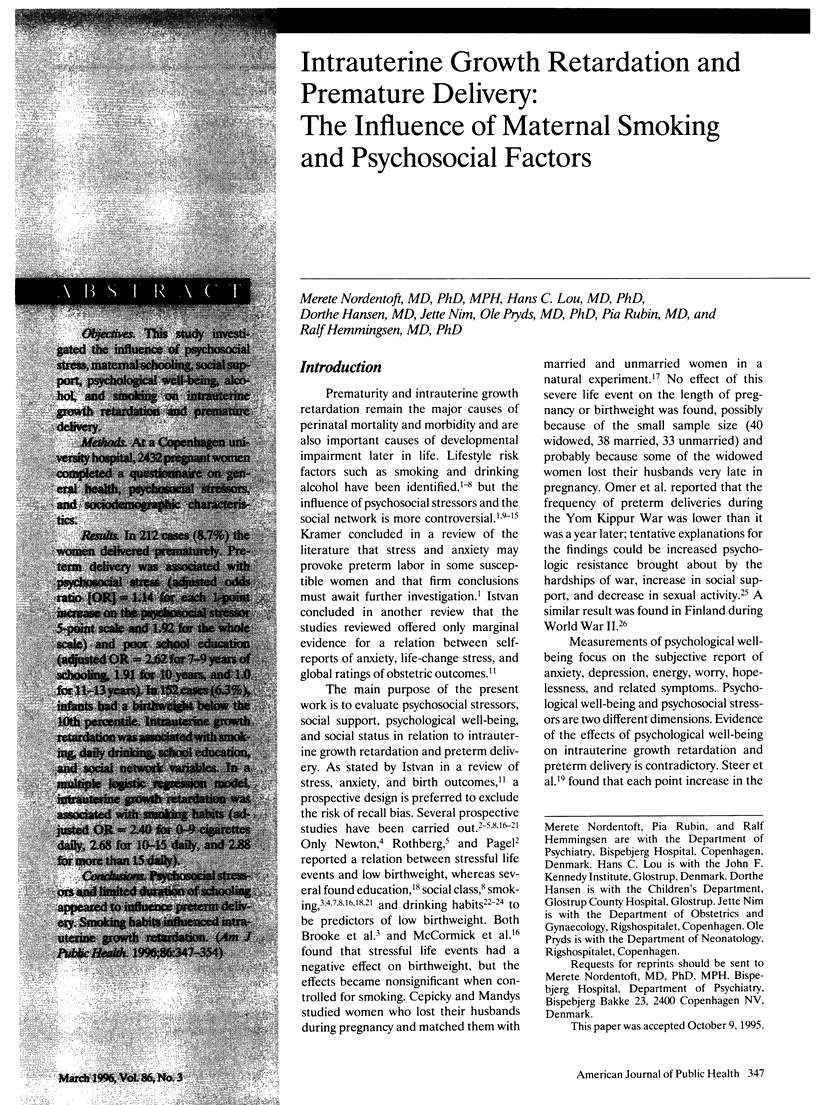
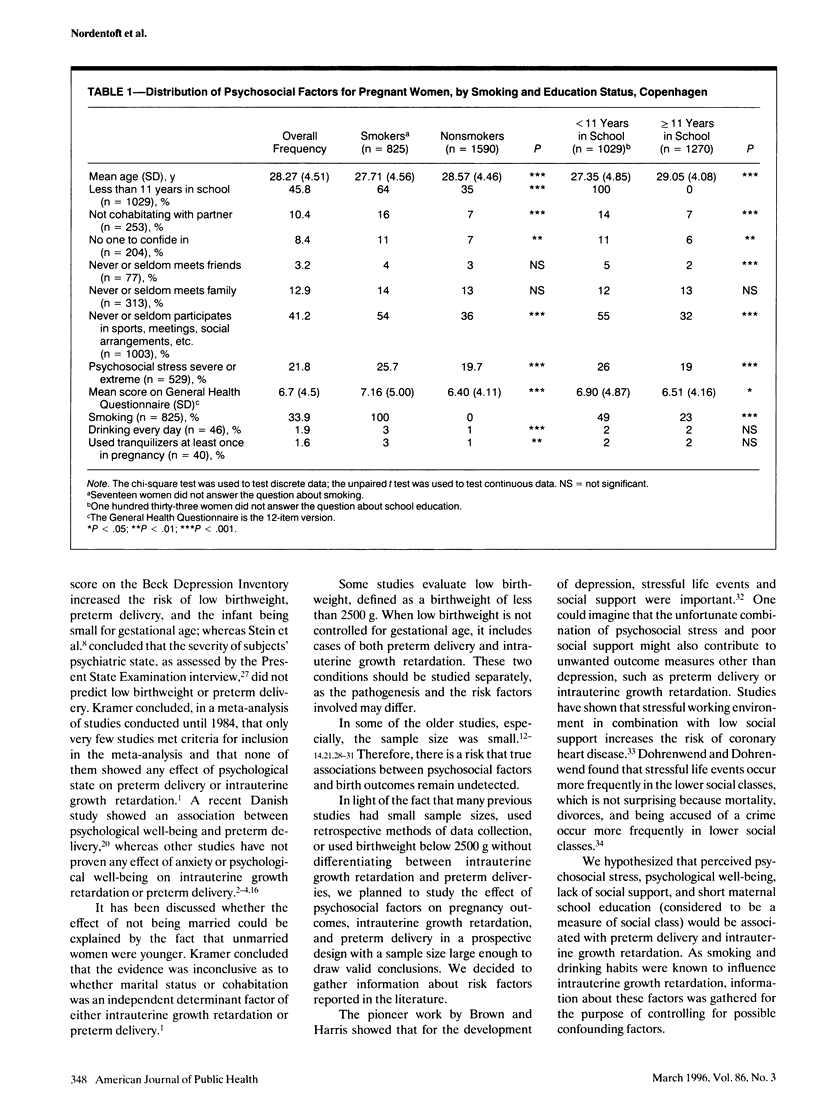
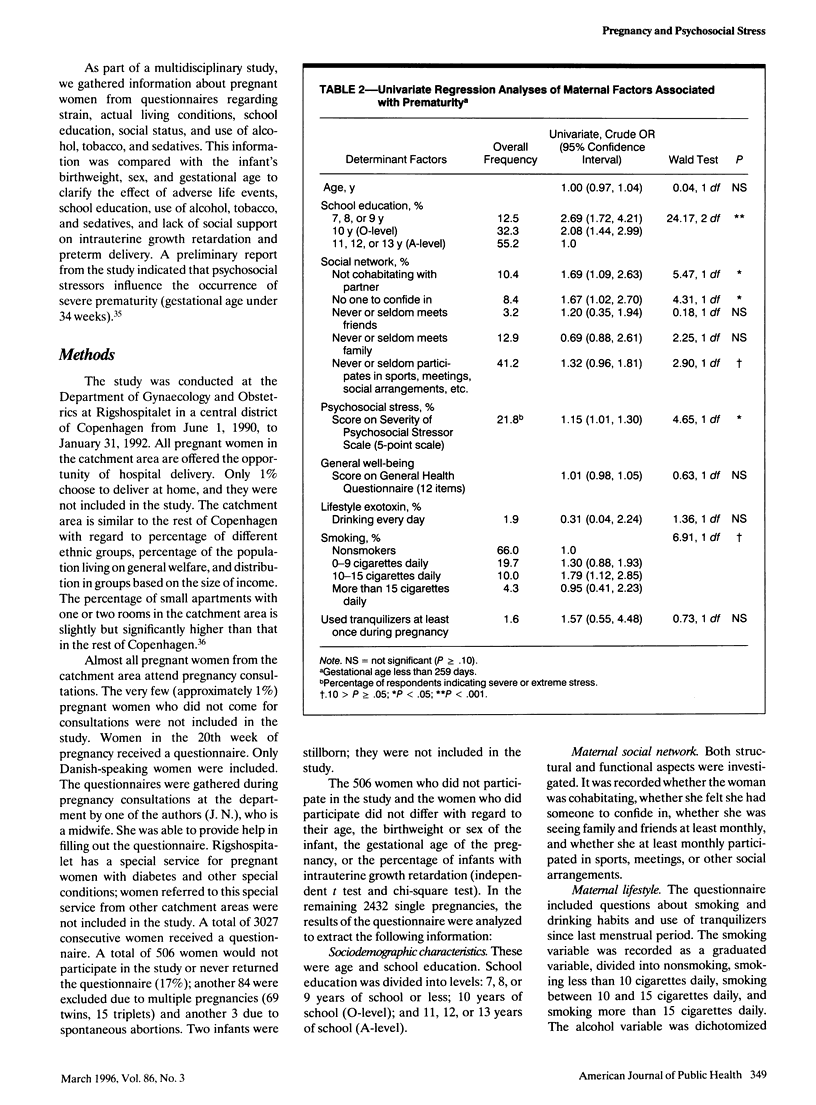
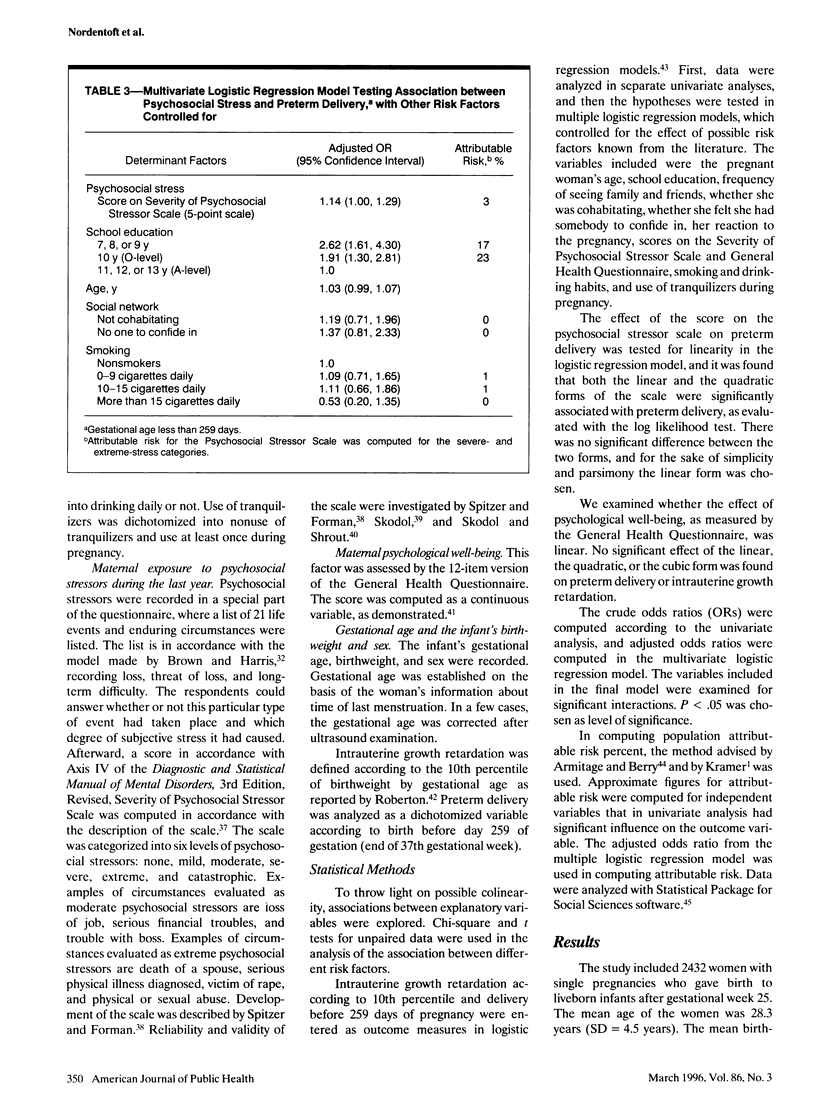
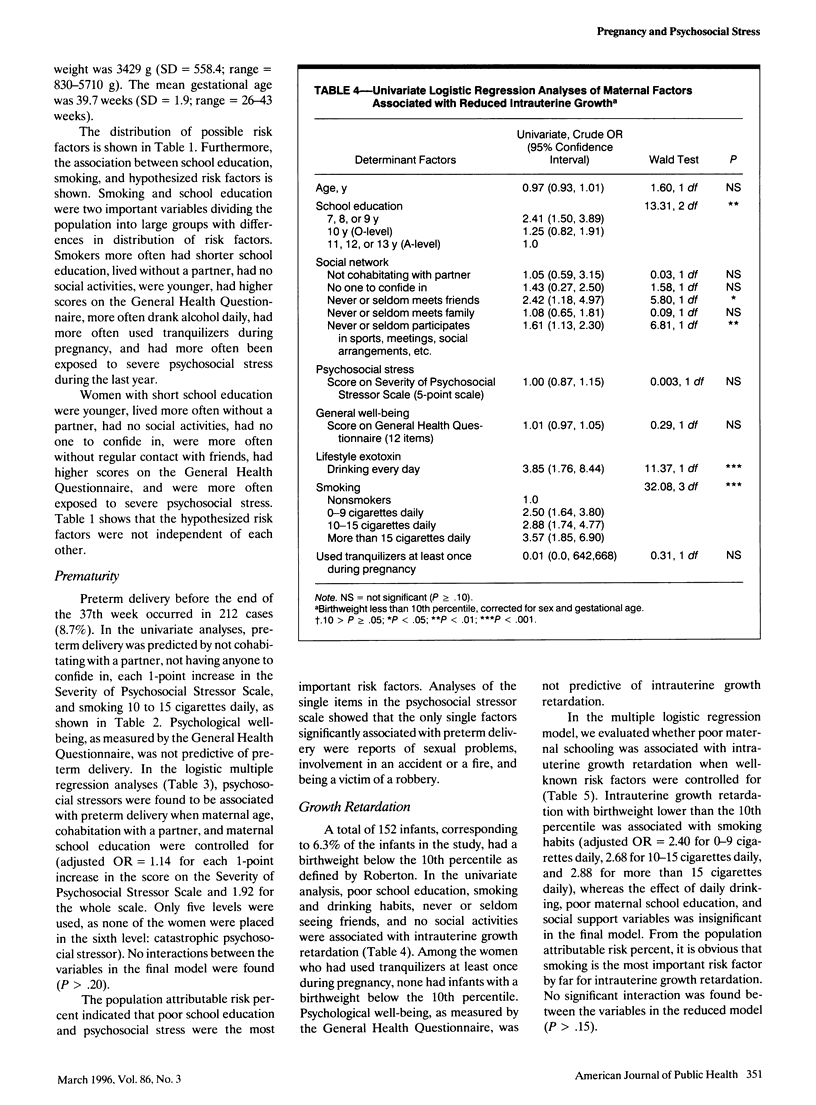
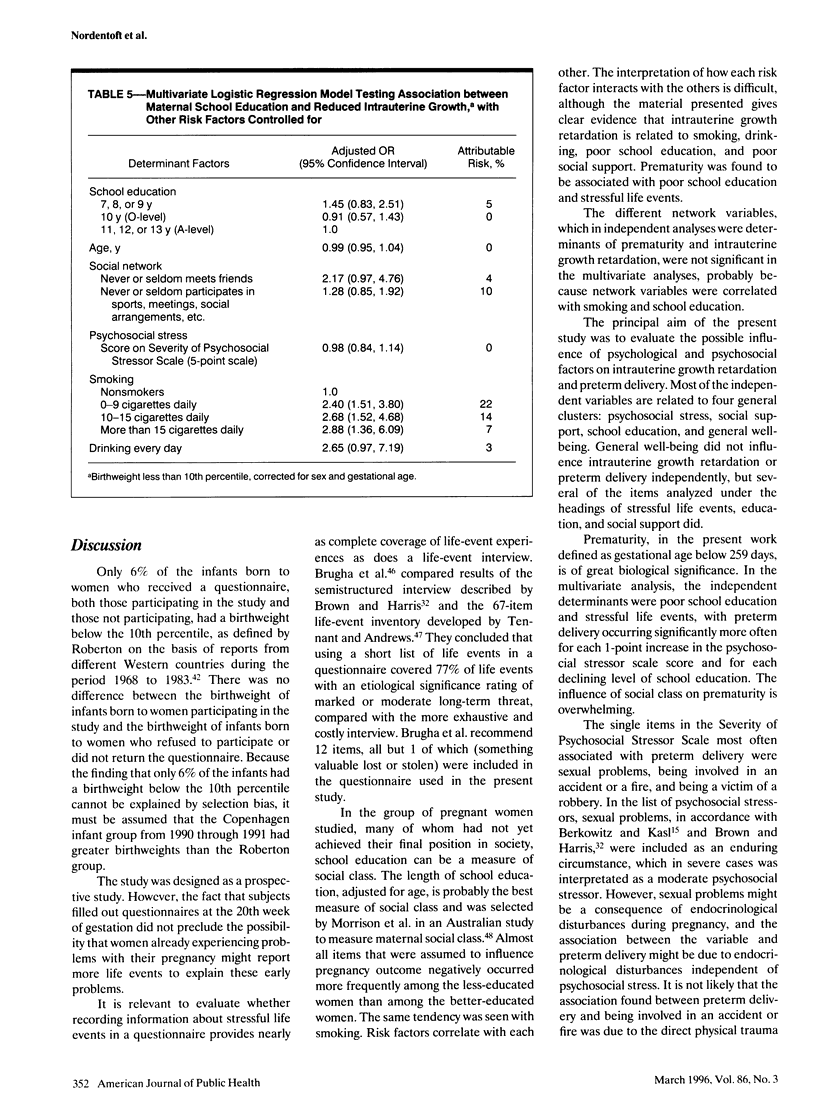
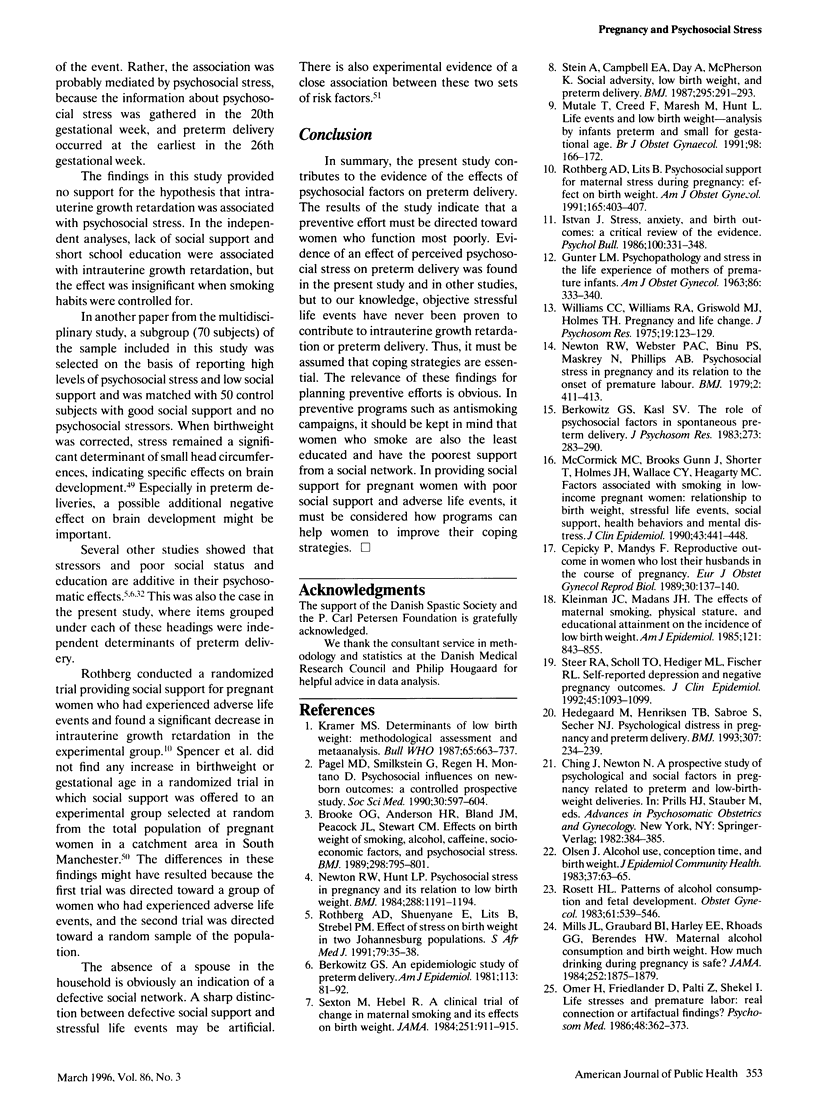
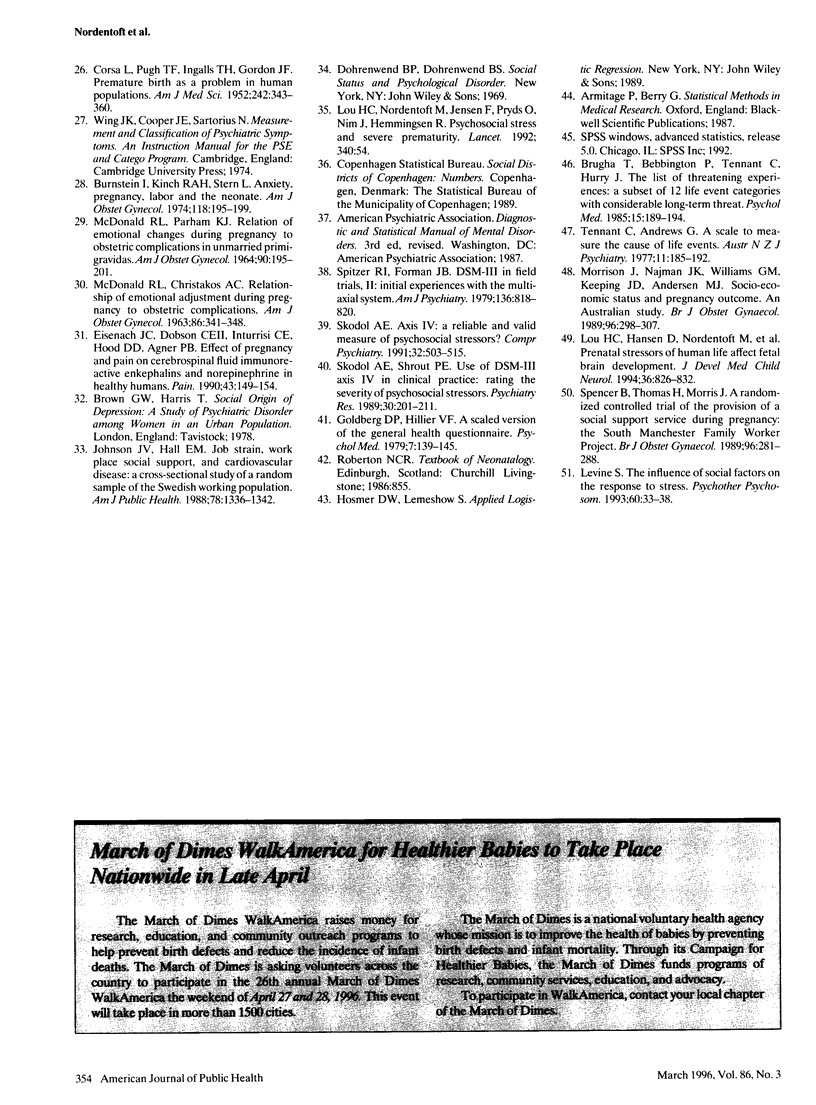
Selected References
These references are in PubMed. This may not be the complete list of references from this article.
- Berkowitz G. S. An epidemiologic study of preterm delivery. Am J Epidemiol. 1981 Jan;113(1):81–92. doi: 10.1093/oxfordjournals.aje.a113068. [DOI] [PubMed] [Google Scholar]
- Berkowitz G. S., Kasl S. V. The role of psychosocial factors in spontaneous preterm delivery. J Psychosom Res. 1983;27(4):283–290. doi: 10.1016/0022-3999(83)90050-8. [DOI] [PubMed] [Google Scholar]
- Brooke O. G., Anderson H. R., Bland J. M., Peacock J. L., Stewart C. M. Effects on birth weight of smoking, alcohol, caffeine, socioeconomic factors, and psychosocial stress. BMJ. 1989 Mar 25;298(6676):795–801. doi: 10.1136/bmj.298.6676.795. [DOI] [PMC free article] [PubMed] [Google Scholar]
- Brugha T., Bebbington P., Tennant C., Hurry J. The List of Threatening Experiences: a subset of 12 life event categories with considerable long-term contextual threat. Psychol Med. 1985 Feb;15(1):189–194. doi: 10.1017/s003329170002105x. [DOI] [PubMed] [Google Scholar]
- Burstein I., Kinch R. A., Stern L. Anxiety, pregnancy, labor, and the neonate. Am J Obstet Gynecol. 1974 Jan 15;118(2):195–199. doi: 10.1016/0002-9378(74)90549-3. [DOI] [PubMed] [Google Scholar]
- CORSA L., Jr, PUGH T. F., INGALLS T. H., GORDON J. E. Premature birth as a problem of human populations. Am J Med Sci. 1952 Sep;224(3):343–360. doi: 10.1097/00000441-195209000-00015. [DOI] [PubMed] [Google Scholar]
- Cepický P., Mandys F. Reproductive outcome in women who lost their husbands in the course of pregnancy. Eur J Obstet Gynecol Reprod Biol. 1989 Feb;30(2):137–140. doi: 10.1016/0028-2243(89)90060-9. [DOI] [PubMed] [Google Scholar]
- Eisenach J. C., Dobson C. E., 2nd, Inturrisi C. E., Hood D. D., Agner P. B. Effect of pregnancy and pain on cerebrospinal fluid immunoreactive enkephalins and norepinephrine in healthy humans. Pain. 1990 Nov;43(2):149–154. doi: 10.1016/0304-3959(90)91067-S. [DOI] [PubMed] [Google Scholar]
- GUNTER L. M. Psychopathology and stress in the life experience of mothers of premature infants. A comparative study. Am J Obstet Gynecol. 1963 Jun 1;86:333–340. doi: 10.1016/0002-9378(63)90009-7. [DOI] [PubMed] [Google Scholar]
- Goldberg D. P., Hillier V. F. A scaled version of the General Health Questionnaire. Psychol Med. 1979 Feb;9(1):139–145. doi: 10.1017/s0033291700021644. [DOI] [PubMed] [Google Scholar]
- Hedegaard M., Henriksen T. B., Sabroe S., Secher N. J. Psychological distress in pregnancy and preterm delivery. BMJ. 1993 Jul 24;307(6898):234–239. doi: 10.1136/bmj.307.6898.234. [DOI] [PMC free article] [PubMed] [Google Scholar]
- Istvan J. Stress, anxiety, and birth outcomes: a critical review of the evidence. Psychol Bull. 1986 Nov;100(3):331–348. [PubMed] [Google Scholar]
- Johnson J. V., Hall E. M. Job strain, work place social support, and cardiovascular disease: a cross-sectional study of a random sample of the Swedish working population. Am J Public Health. 1988 Oct;78(10):1336–1342. doi: 10.2105/ajph.78.10.1336. [DOI] [PMC free article] [PubMed] [Google Scholar]
- Kleinman J. C., Madans J. H. The effects of maternal smoking, physical stature, and educational attainment on the incidence of low birth weight. Am J Epidemiol. 1985 Jun;121(6):843–855. doi: 10.1093/oxfordjournals.aje.a114055. [DOI] [PubMed] [Google Scholar]
- Kramer M. S. Determinants of low birth weight: methodological assessment and meta-analysis. Bull World Health Organ. 1987;65(5):663–737. [PMC free article] [PubMed] [Google Scholar]
- Levine S. The influence of social factors on the response to stress. Psychother Psychosom. 1993;60(1):33–38. doi: 10.1159/000288677. [DOI] [PubMed] [Google Scholar]
- Lou H. C., Hansen D., Nordentoft M., Pryds O., Jensen F., Nim J., Hemmingsen R. Prenatal stressors of human life affect fetal brain development. Dev Med Child Neurol. 1994 Sep;36(9):826–832. doi: 10.1111/j.1469-8749.1994.tb08192.x. [DOI] [PubMed] [Google Scholar]
- Lou H. C., Nordentoft M., Jensen F., Pryds O., Nim J., Hemmingsen R. Psychosocial stress and severe prematurity. Lancet. 1992 Jul 4;340(8810):54–54. doi: 10.1016/0140-6736(92)92468-u. [DOI] [PubMed] [Google Scholar]
- MCDONALD R. L., PARHAM K. J. RELATION OF EMOTIONAL CHANGES DURING PREGNANCY TO OBSTETRIC COMPLICATIONS IN UNMARRIED PRIMIGRAVIDAS. Am J Obstet Gynecol. 1964 Sep 15;90:195–201. doi: 10.1016/0002-9378(64)90479-x. [DOI] [PubMed] [Google Scholar]
- McCormick M. C., Brooks-Gunn J., Shorter T., Holmes J. H., Wallace C. Y., Heagarty M. C. Factors associated with smoking in low-income pregnant women: relationship to birth weight, stressful life events, social support, health behaviors and mental distress. J Clin Epidemiol. 1990;43(5):441–448. doi: 10.1016/0895-4356(90)90132-9. [DOI] [PubMed] [Google Scholar]
- Mills J. L., Graubard B. I., Harley E. E., Rhoads G. G., Berendes H. W. Maternal alcohol consumption and birth weight. How much drinking during pregnancy is safe? JAMA. 1984 Oct 12;252(14):1875–1879. [PubMed] [Google Scholar]
- Morrison J., Najman J. M., Williams G. M., Keeping J. D., Andersen M. J. Socio-economic status and pregnancy outcome. An Australian study. Br J Obstet Gynaecol. 1989 Mar;96(3):298–307. doi: 10.1111/j.1471-0528.1989.tb02389.x. [DOI] [PubMed] [Google Scholar]
- Mutale T., Creed F., Maresh M., Hunt L. Life events and low birthweight--analysis by infants preterm and small for gestational age. Br J Obstet Gynaecol. 1991 Feb;98(2):166–172. doi: 10.1111/j.1471-0528.1991.tb13363.x. [DOI] [PubMed] [Google Scholar]
- Newton R. W., Hunt L. P. Psychosocial stress in pregnancy and its relation to low birth weight. Br Med J (Clin Res Ed) 1984 Apr 21;288(6425):1191–1194. doi: 10.1136/bmj.288.6425.1191. [DOI] [PMC free article] [PubMed] [Google Scholar]
- Newton R. W., Webster P. A., Binu P. S., Maskrey N., Phillips A. B. Psychosocial stress in pregnancy and its relation to the onset of premature labour. Br Med J. 1979 Aug 18;2(6187):411–413. doi: 10.1136/bmj.2.6187.411. [DOI] [PMC free article] [PubMed] [Google Scholar]
- Olsen J., Rachootin P., Schiødt A. V. Alcohol use, conception time, and birth weight. J Epidemiol Community Health. 1983 Mar;37(1):63–65. doi: 10.1136/jech.37.1.63. [DOI] [PMC free article] [PubMed] [Google Scholar]
- Omer H., Friedlander D., Palti Z., Shekel I. Life stresses and premature labor: real connection or artifactual findings? Psychosom Med. 1986 May-Jun;48(5):362–369. doi: 10.1097/00006842-198605000-00006. [DOI] [PubMed] [Google Scholar]
- Pagel M. D., Smilkstein G., Regen H., Montano D. Psychosocial influences on new born outcomes: a controlled prospective study. Soc Sci Med. 1990;30(5):597–604. doi: 10.1016/0277-9536(90)90158-o. [DOI] [PubMed] [Google Scholar]
- Rosett H. L., Weiner L., Lee A., Zuckerman B., Dooling E., Oppenheimer E. Patterns of alcohol consumption and fetal development. Obstet Gynecol. 1983 May;61(5):539–546. [PubMed] [Google Scholar]
- Rothberg A. D., Lits B. Psychosocial support for maternal stress during pregnancy: effect on birth weight. Am J Obstet Gynecol. 1991 Aug;165(2):403–407. doi: 10.1016/0002-9378(91)90103-x. [DOI] [PubMed] [Google Scholar]
- Rothberg A. D., Shuenyane E., Lits B., Strebel P. M. Effect of stress on birth weight in two Johannesburg populations. S Afr Med J. 1991 Jan 5;79(1):35–38. [PubMed] [Google Scholar]
- Sexton M., Hebel J. R. A clinical trial of change in maternal smoking and its effect on birth weight. JAMA. 1984 Feb 17;251(7):911–915. [PubMed] [Google Scholar]
- Skodol A. E. Axis IV: a reliable and valid measure of psychosocial stressors? Compr Psychiatry. 1991 Nov-Dec;32(6):503–515. doi: 10.1016/0010-440x(91)90029-c. [DOI] [PubMed] [Google Scholar]
- Skodol A. E., Shrout P. E. Use of DSM-III Axis IV in clinical practice: rating the severity of psychosocial stressors. Psychiatry Res. 1989 Nov;30(2):201–211. doi: 10.1016/0165-1781(89)90161-3. [DOI] [PubMed] [Google Scholar]
- Spencer B., Thomas H., Morris J. A randomized controlled trial of the provision of a social support service during pregnancy: the South Manchester Family Worker Project. Br J Obstet Gynaecol. 1989 Mar;96(3):281–288. doi: 10.1111/j.1471-0528.1989.tb02387.x. [DOI] [PubMed] [Google Scholar]
- Spitzer R. L., Forman J. B. DSM-III field trials: II. Initial experience with the multiaxial system. Am J Psychiatry. 1979 Jun;136(6):818–820. doi: 10.1176/ajp.136.6.818. [DOI] [PubMed] [Google Scholar]
- Steer R. A., Scholl T. O., Hediger M. L., Fischer R. L. Self-reported depression and negative pregnancy outcomes. J Clin Epidemiol. 1992 Oct;45(10):1093–1099. doi: 10.1016/0895-4356(92)90149-h. [DOI] [PubMed] [Google Scholar]
- Stein A., Campbell E. A., Day A., McPherson K., Cooper P. J. Social adversity, low birth weight, and preterm delivery. Br Med J (Clin Res Ed) 1987 Aug 1;295(6593):291–293. doi: 10.1136/bmj.295.6593.291. [DOI] [PMC free article] [PubMed] [Google Scholar]
- Williams C. C., Williams A., Griswold M. J., Holmes T. H. Pregnancy and life change. J Psychosom Res. 1975 Apr;19(2):123–129. doi: 10.1016/0022-3999(75)90059-8. [DOI] [PubMed] [Google Scholar]


